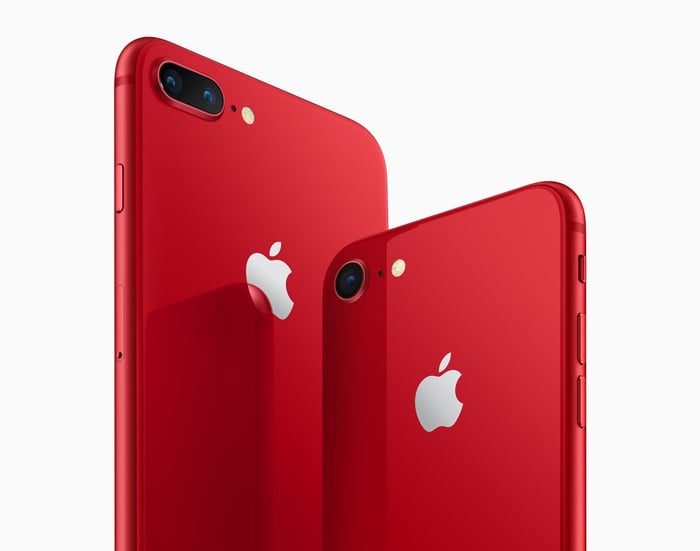Later this year, Apple Inc. (AAPL -2.41%) is expected to unveil a trio of next-generation iPhones. At the heart of these new iPhones will be a new applications processor, likely called the A12.
The A12 should bring a big leap in performance and efficiency compared to the company's prior generation A11 Bionic chip, thanks to design improvements by Apple coupled with a migration to Taiwan Semiconductor Manufacturing Company's (TSM 0.60%) new 7-nanometer chip manufacturing technology.

Image source: Apple.
The Taiwan Semiconductor (TSMC) 7-nanometer technology, referred to as N7, promises performance, power efficiency, and chip area improvements over the N10 technology that's used to manufacture Apple's A11 chip.
According to TSMC executives on the company's most recent earnings conference call, N7 is now in high volume production. It's very likely that the lead product to be manufactured on TSMC's N7 technology is the Apple A12 chip, which seems to indicate that TSMC has begun producing Apple's A12 chip.
The good news for Apple, then, is that this is right on schedule. Allow me to explain.
It takes time to build chips
Chips are produced by applying a complex series of processing steps to a silicon wafer. The processing of a wafer is so complex that it doesn't just take a few hours or even a few days to go from a blank wafer to a fully processed one -- it generally takes months.
A good rule of thumb is that it takes around three months to go from a blank wafer to a fully processed one. After the wafer is processed and the individual chips, known as dies, are freed, the chips are then mounted onto silicon packages, tested, and sent to the customer (in this case, Apple's contract manufacturers). The packaging and testing take additional time.
On top of the significant time needed to build, package, and test the chips from start to finish, it takes time for Apple's contract manufacturers to incorporate those chips into finished devices.
Right on cue
If Apple is going to be shipping millions of new iPhones to customers within weeks of their announcements sometime in mid-September, then it'll need to have finished iPhones rolling off the production lines sometime in mid-to-late August.
Considering how long it takes to go from a blank silicon wafer to a fully packaged and tested processor, and considering the sheer volumes of A12 chips that Apple will need to support its launch, it makes perfect sense that TSMC is starting to produce the chips now, in April.
If we assume production began on April 1, then the first chips should be rolling off TSMC's manufacturing lines roughly three months later, in early July. If Apple's contract manufacturers get the first batches of A12 chips in early July, then it's reasonable to expect fully finished iPhones to start coming out in late July or early August. With enough lead time, Apple should be able to produce millions of these phones to support a launch in September.
In other words, everything seems to be going to plan. We'll get to see just how good both TSMC's N7 manufacturing technology and Apple's A12 chip design are in less than six months -- and I can't wait!





